The Senate's top Democrat called on the Federal Aviation Administration Sunday to heed warnings from federal safety investigators and require all helicopters be equipped with flight data recorders, commonly known as a "black box."
Sen. Charles Schumer's call for action comes days after a helicopter crashed on the roof of a Manhattan skyscraper , killing the pilot. The helicopter was not equipped with a flight data recorder or a cockpit voice recorder, according to federal investigators.
The National Transportation Safety Board has pushed the FAA to implement its data recorder safety recommendation for years. In documents reviewed by The Associated Press, the NTSB said the FAA has maintained it has been unable to justify the mandate because "the benefits of recorders are difficult to identify and quantify because the absence of a recorder will never cause an accident."
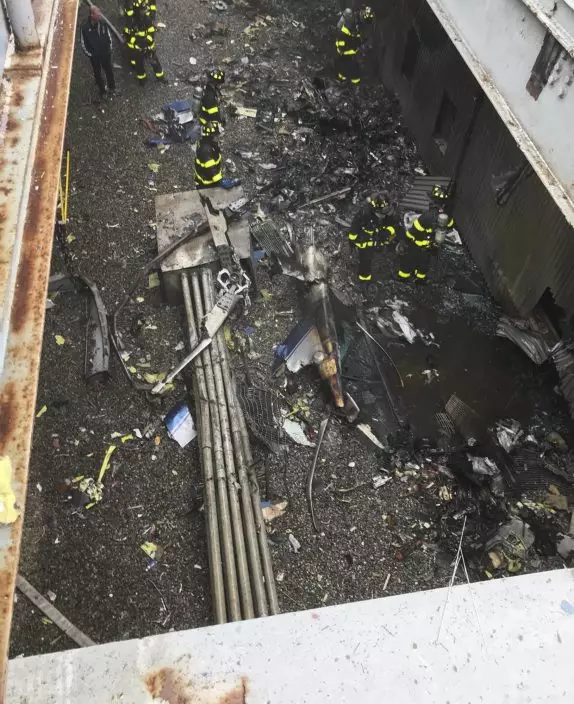
This photo released by the New York City Fire Department shows damage caused by a helicopter crash, south of Central Park in New York on Monday, June 10, 2019. The crash that killed the pilot and occurred near Times Square and Trump Tower shook the 750-foot (229-meter) AXA Equitable building sparked a fire and forced office workers to flee on elevators and down stairs, witnesses and officials said. (FDNY via AP)
Large commercial planes and some private aircraft are required, under FAA regulations, to have two so-called "black boxes" that record information — a flight data recorder that monitors altitude and other instrumentation, and a cockpit voice recorder, which records radio transmissions and sounds in the cockpit. But there is no such requirement for helicopters.
"To know that the NTSB has been trying for years, without success, to compel the FAA to take action as it relates to making helicopters more valuable to safety by installing flight data recorders is cause for serious concern," Schumer, D-N.Y., said in a statement to the AP.
The FAA said in a statement it was supporting the NTSB's investigation into the New York crash and that it was "premature to consider any actions pending the outcome of the investigation."
The NTSB has been recommending data recorders on helicopters for several years and pushed the FAA to enact new regulations after a medical helicopter crashed in Missouri in 2011, killing four people. Safety investigators said the pilot had been texting and recommended the FAA require all newly manufactured nonexperimental helicopters be required to have both flight data recorders and cockpit voice recorders.
The FAA has not enacted any such requirement.
"In the name of safety, the FAA must take another look at the NTSB's reports on chopper crashes similar to the one in New York City just last week and propel the safety measures that have been collecting dust for far too long," Schumer said.
In a notice to the FAA last year, the NTSB said 159 aircraft involved in crashes from 2005 to 2017 had no form of recording equipment. The NTSB, which is charged with investigating transportation crashes across the U.S., said it was more difficult to investigate with the lack of information.
Of those 159 crashes, the NTSB was not able to determine the probable cause for 18 of them, the agency said. It argues federal investigators would have more information to conduct critical safety probes if the data recorders were installed.
This week's crash was the second in Manhattan in a month and led renewed calls for restricting helicopter flights over the city.
U.S. Rep. Carolyn Maloney, a Democrat who represents the area where the crash occurred, said last week that the FAA must ban "non-essential" flights over Manhattan and pledged to hold the FAA "accountable" for the crash.
Officials have said the helicopter's pilot, 58-year-old Tim McCormack, was not authorized to fly in limited visibility, raising questions about why he took off in the first place in rain and dense fog.
Follow Balsamo on Twitter at www.twitter.com/MikeBalsamo1
VENICE, Italy (AP) — Under the gaze of the world’s media, the fragile lagoon city of Venice launches a pilot program Thursday to charge day-trippers a 5-euro (around $5.35) entry fee that authorities hope will discourage visitors from arriving on peak days and make the city more livable for its dwindling residents.
Signs advising arriving visitors of the new requirement for a test phase of 29 days through July have been erected outside the main train station and other points of arrival.
Some 200 stewards have been trained to politely walk anyone unaware of the fee through the process of downloading a QR code. A kiosk has been set up for those not equipped with a smartphone. Once past designated entry ports, officials will carry out random checks for QR codes that show the day-tripper tax has been paid or that the bearer is exempt.
Transgressors face fines 50 euros to 300 euros. The requirement applies only for people arriving between 8:30 a.m. and 4 p.m. Outside of those hours, access is free.
“We need to find a new balance between the tourists and residents,’’ said the city’s top tourism official, Simone Venturini. “We need to safeguard the spaces of the residents, of course, and we need to discourage the arrival of day-trippers on some particular days.”
Venice has long suffered under the pressure of over-tourism, but officials say that pre-pandemic estimates ranging from 25 million to 30 million visitors a year — including day-trippers — are not reliable and that the pilot project also aims to come up with more exact figures to help better manage the phenomenon.
By contrast, registered visitors spending the night last year numbered 4.6 million, according to city figures, down 16% from pre-pandemic highs.
Venturini said the city is strained when the number of day-trippers reaches 30,000 to 40,000. Its narrow alleyways are clogged with people and water taxis packed, making it difficult for residents to go about their business.
Not all residents, however, are persuaded of the efficacy of the new system in dissuading mass tourism, and say more attention needs to be paid to boosting the resident population and services they need.
Venice last year passed a telling milestone when the number of tourist beds exceeded for the first time the number of official residents, which is now below 50,000 in the historic center with its picturesque canals.
“Putting a ticket to enter a city will not decrease not even by one single unit the number of visitors that are coming,’’ said Tommaso Cacciari, an activist who organized a protest Thursday against the measure.
“You pay a ticket to take the metro, to go to a museum, an amusement park; you don’t pay a ticket to enter a city. This is the last symbolic step of a project of an idea of this municipal administration to kick residents out of Venice,” he said.
Venturini said about 6,000 people had already paid to download the QR code, and officials expect paid day-tripper arrivals Thursday to reach some 10,000.
More than 70,000 others have downloaded a QR code denoting an exemption, including to work in Venice or as a resident of the Veneto region. People staying in hotels in Venice, including in mainland districts like Marghera or Mestre, should also get a QR code attesting to their stay, which includes a hotel tax.
The tourist official says interest in Venice's pilot program has been keen from other places suffering from mass tourism, including other Italian art cities and cities abroad such as Barcelona and Amsterdam.
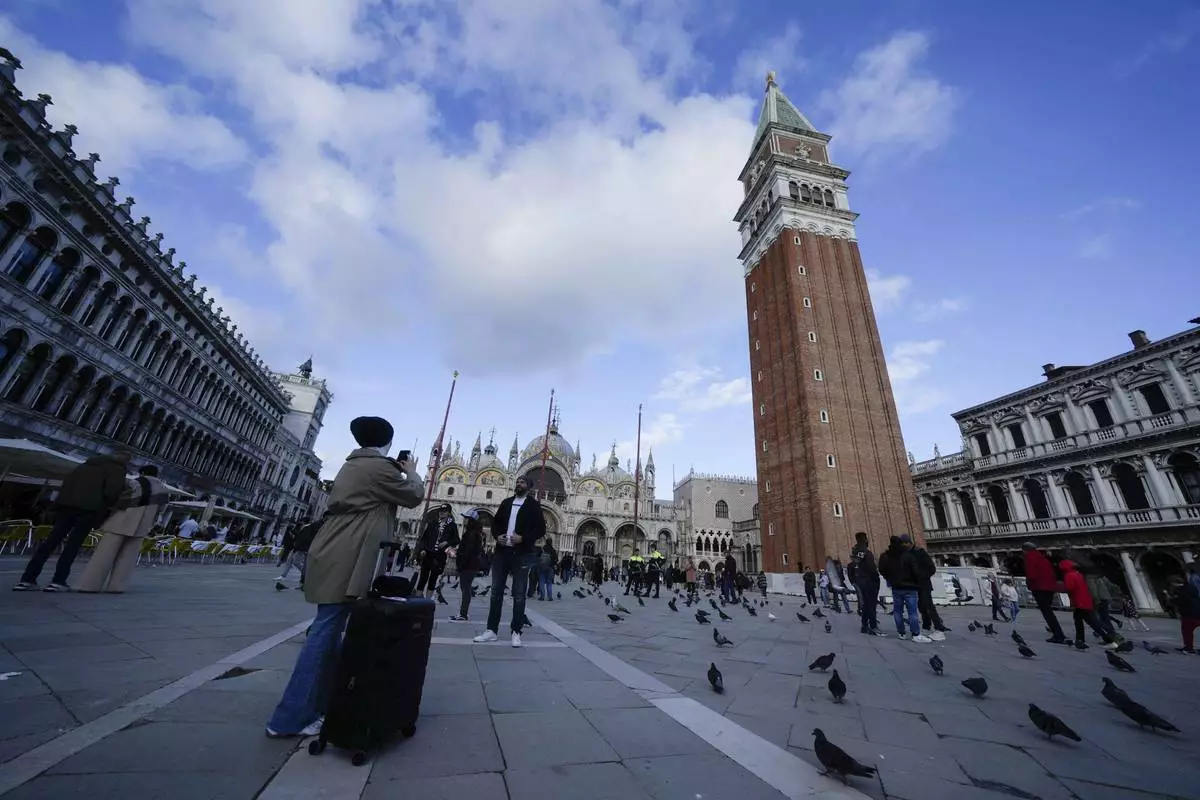
Tourists take pictures at the St. Mark square in Venice, Italy, Wednesday, April 24, 2024. The lagoon city of Venice begins a pilot program Thursday, April 25, 2024 to charge daytrippers a 5 euro entry fee that authorities hope will discourage tourists from arriving on peak days. Officials expect some 10,000 people will pay the fee to access the city on the first day, downloading a QR code to prove their payment. (AP Photo/Luca Bruno)
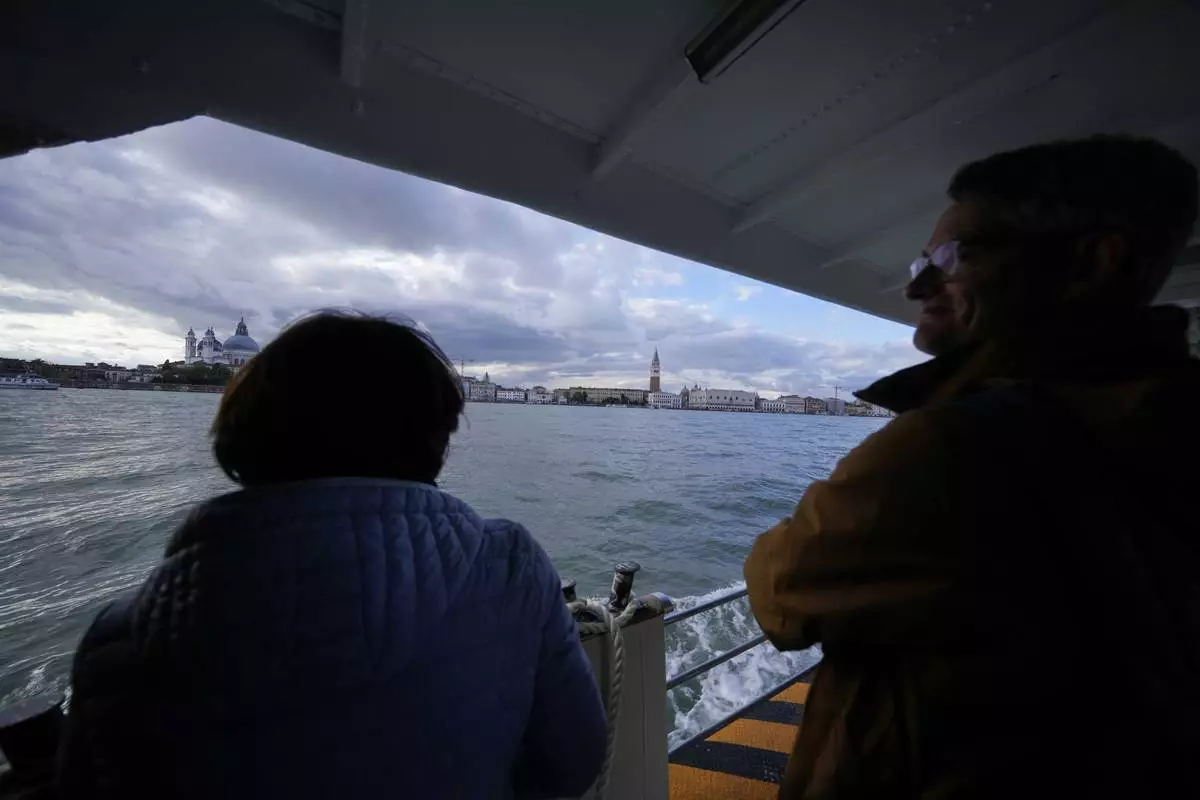
Tourists ride on a ferry boat in Venice, Italy, Wednesday, April 24, 2024. The lagoon city of Venice begins a pilot program Thursday, April 25, 2024 to charge daytrippers a 5 euro entry fee that authorities hope will discourage tourists from arriving on peak days. Officials expect some 10,000 people will pay the fee to access the city on the first day, downloading a QR code to prove their payment. (AP Photo/Luca Bruno)
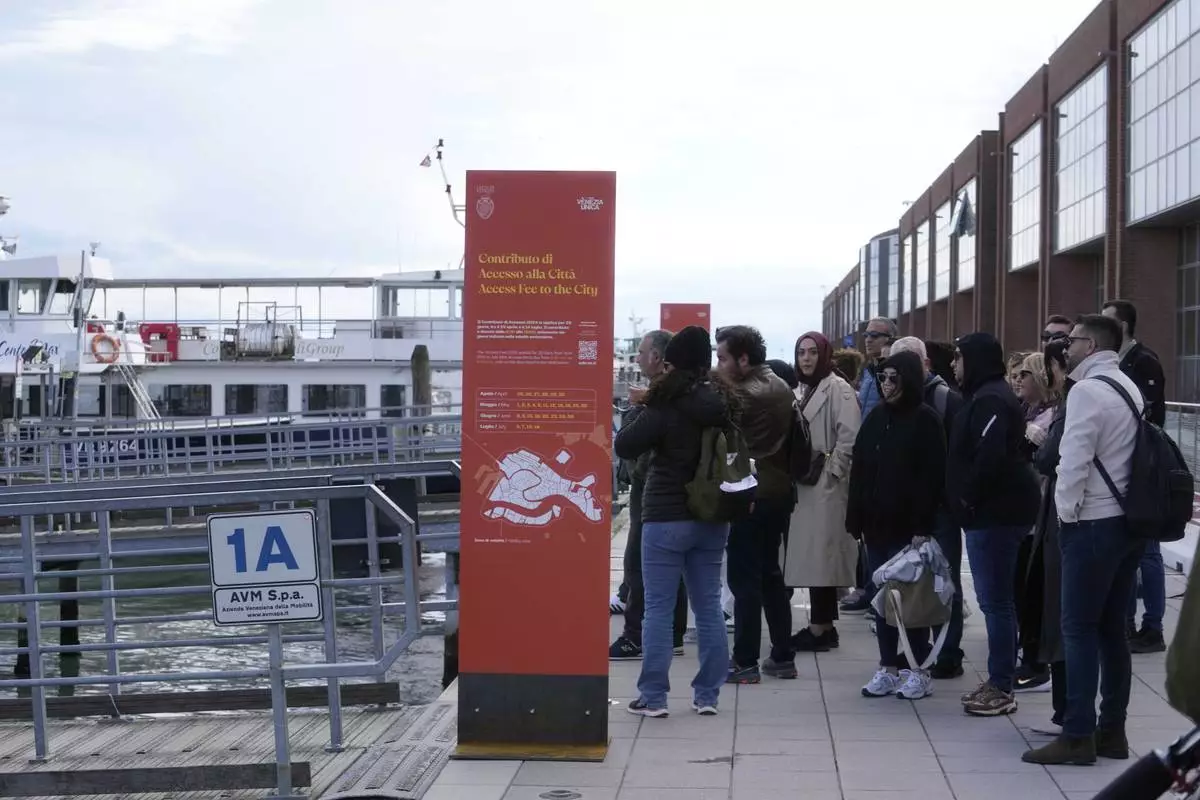
People stand in front of an information board explaining how to pay the tourist tax in Venice, Italy, Wednesday, April 24, 2024. The lagoon city of Venice begins a pilot program Thursday, April 25, 2024 to charge daytrippers a 5 euro entry fee that authorities hope will discourage tourists from arriving on peak days. Officials expect some 10,000 people will pay the fee to access the city on the first day, downloading a QR code to prove their payment. (AP Photo/Luca Bruno)
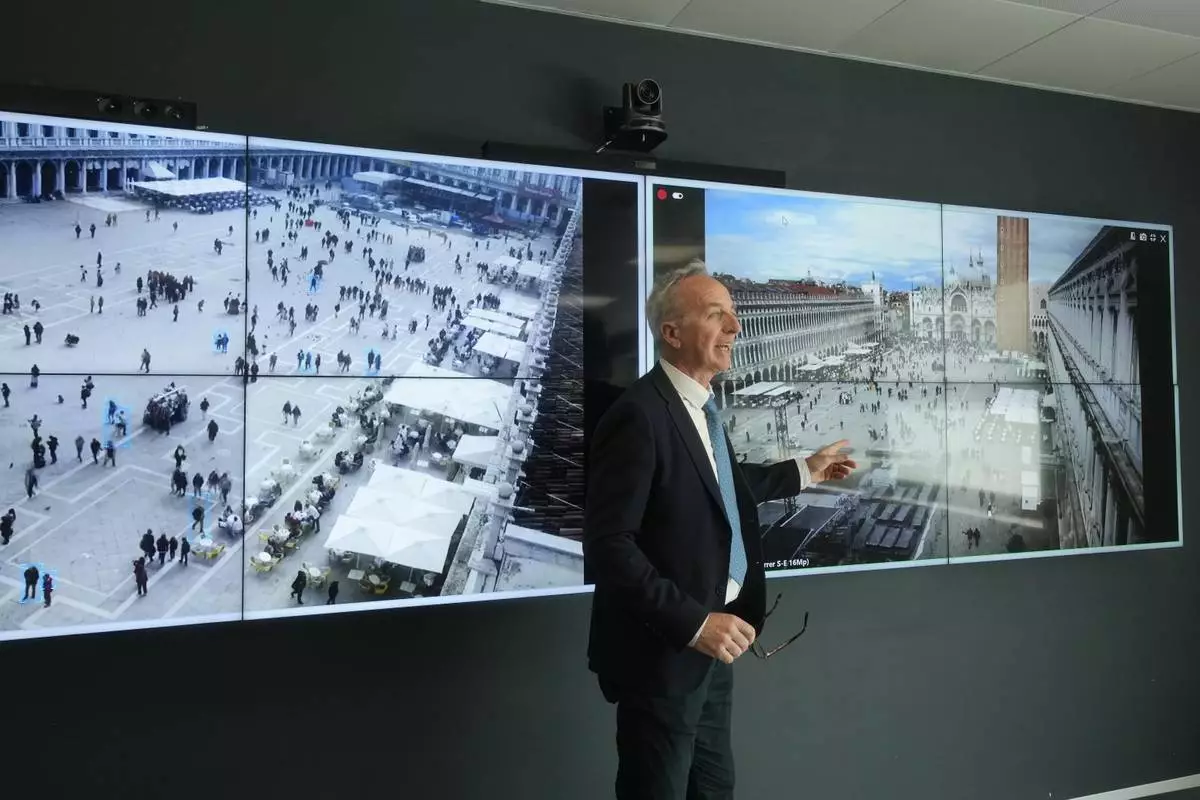
Marco Bettini, director of Venis Informatics System, gestures as he talks to reporters at the police Venice control room, in Venice, Italy, Wednesday, April 24, 2024. The lagoon city of Venice begins a pilot program Thursday, April 25, 2024 to charge daytrippers a 5 euro entry fee that authorities hope will discourage tourists from arriving on peak days. Officials expect some 10,000 people will pay the fee to access the city on the first day, downloading a QR code to prove their payment. (AP Photo/Luca Bruno)
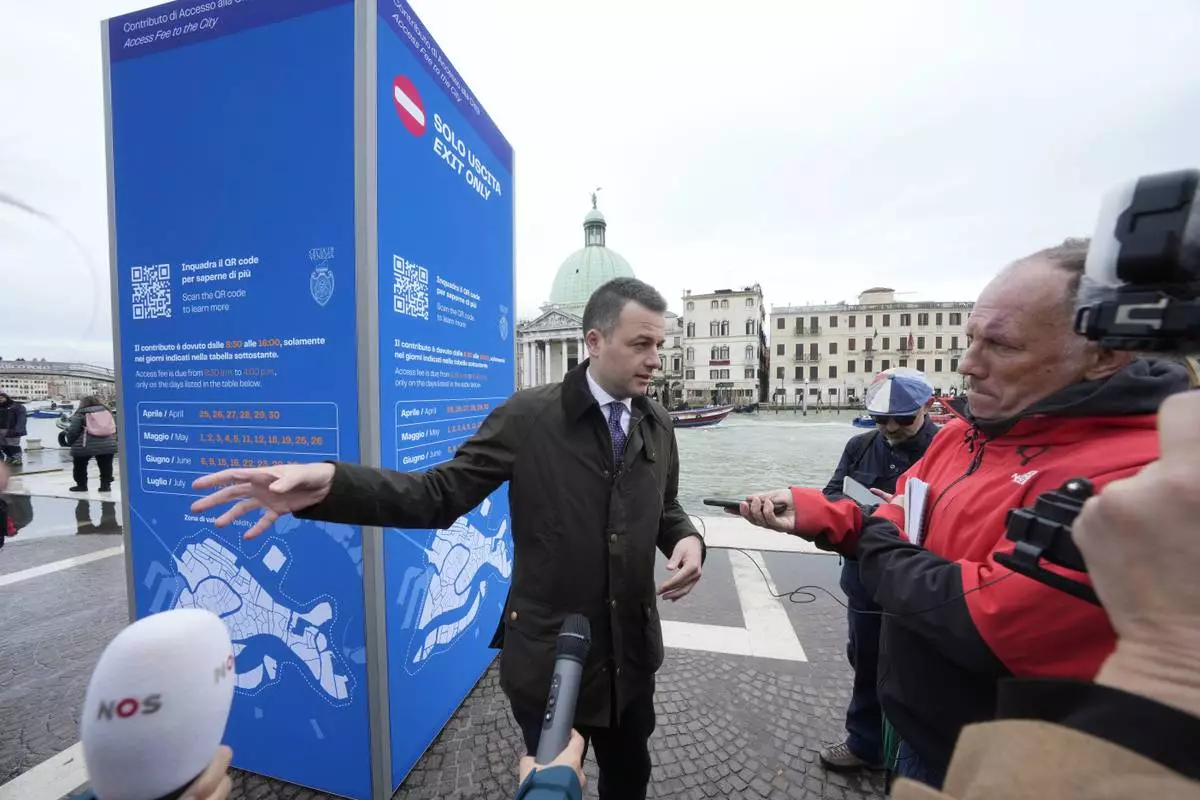
Venice councillor Simone Venturini speaks with reporters in front of a tourist tax totem in Venice, Italy, Wednesday, April 24, 2024. The lagoon city of Venice begins a pilot program Thursday, April 25, 2024 to charge daytrippers a 5 euro entry fee that authorities hope will discourage tourists from arriving on peak days. Officials expect some 10,000 people will pay the fee to access the city on the first day, downloading a QR code to prove their payment. (AP Photo/Luca Bruno)
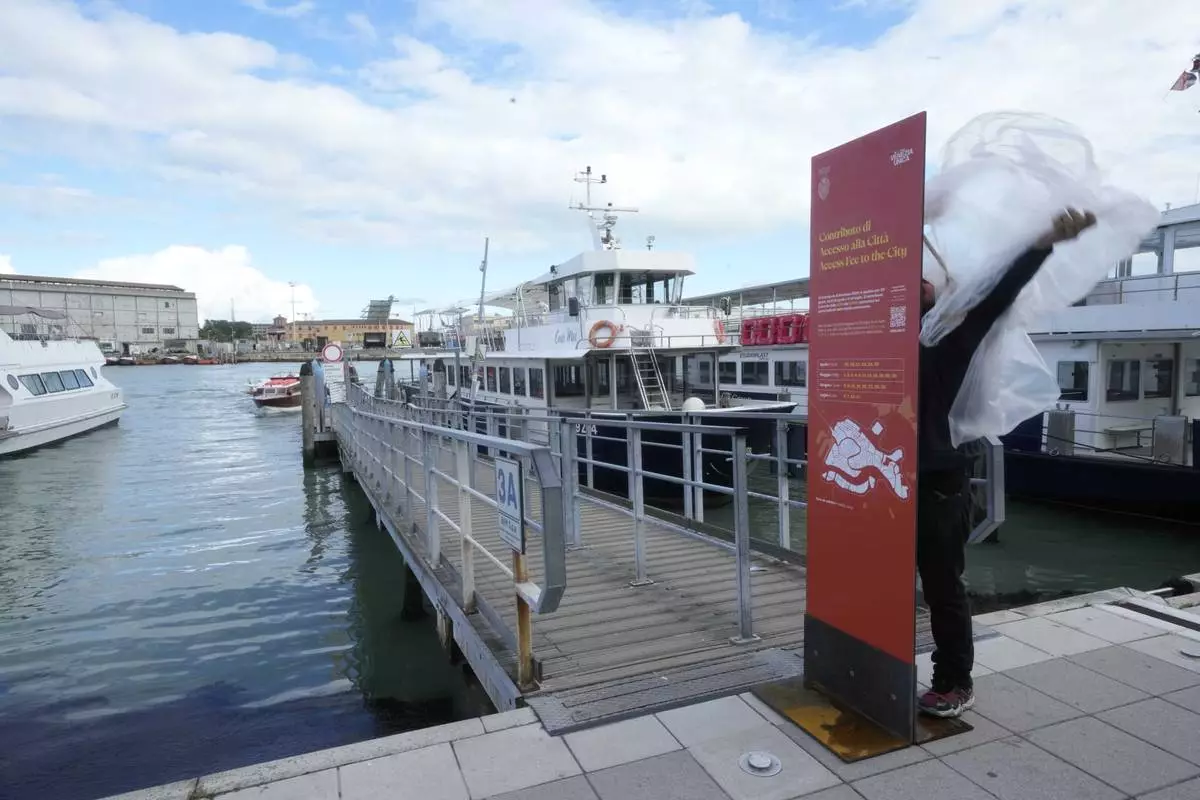
Workers prepare banner explaining how to pay the tourist tax in Venice, Italy, Wednesday, April 24, 2024. The lagoon city of Venice begins a pilot program Thursday, April 25, 2024 to charge daytrippers a 5 euro entry fee that authorities hope will discourage tourists from arriving on peak days. Officials expect some 10,000 people will pay the fee to access the city on the first day, downloading a QR code to prove their payment. (AP Photo/Luca Bruno)
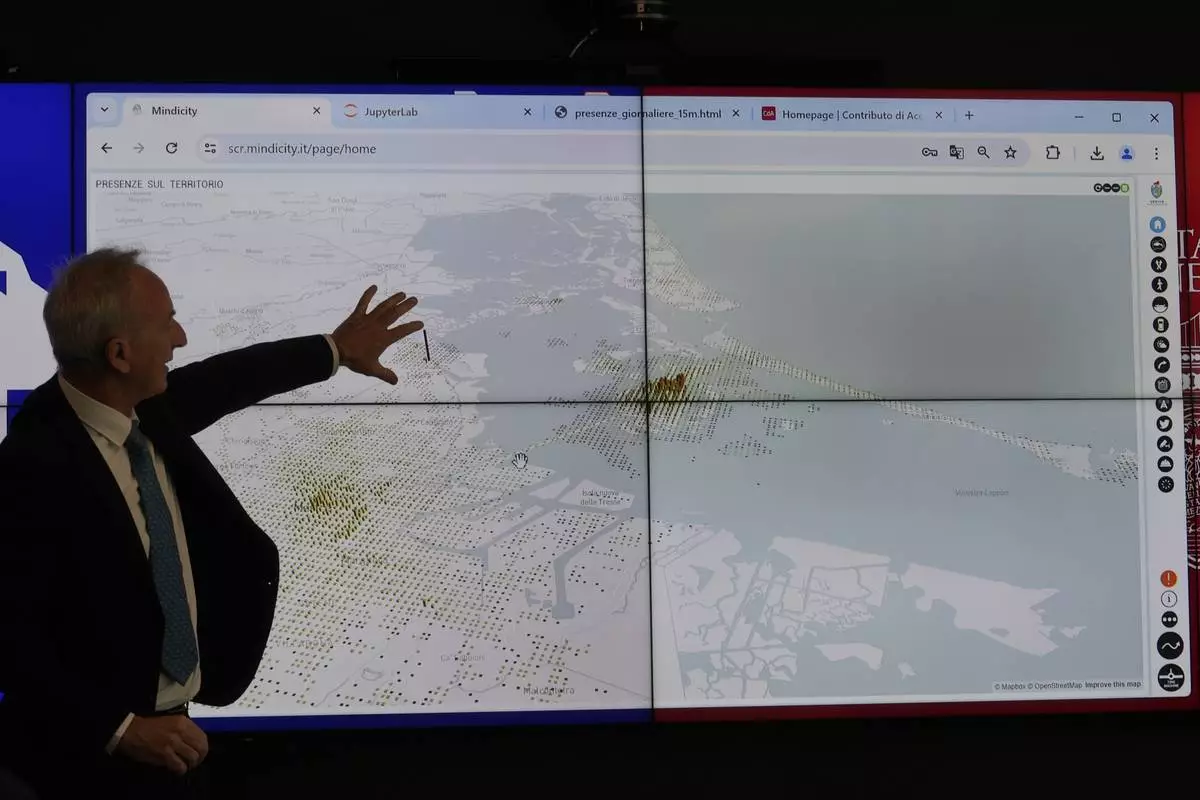
Marco Bettini, director of Venis Informatics System, gestures as he explains the Venice density to reporters at the police Venice control room in Venice, Italy, Wednesday, April 24, 2024. The lagoon city of Venice begins a pilot program Thursday, April 25, 2024 to charge daytrippers a 5 euro entry fee that authorities hope will discourage tourists from arriving on peak days. Officials expect some 10,000 people will pay the fee to access the city on the first day, downloading a QR code to prove their payment. (AP Photo/Luca Bruno)
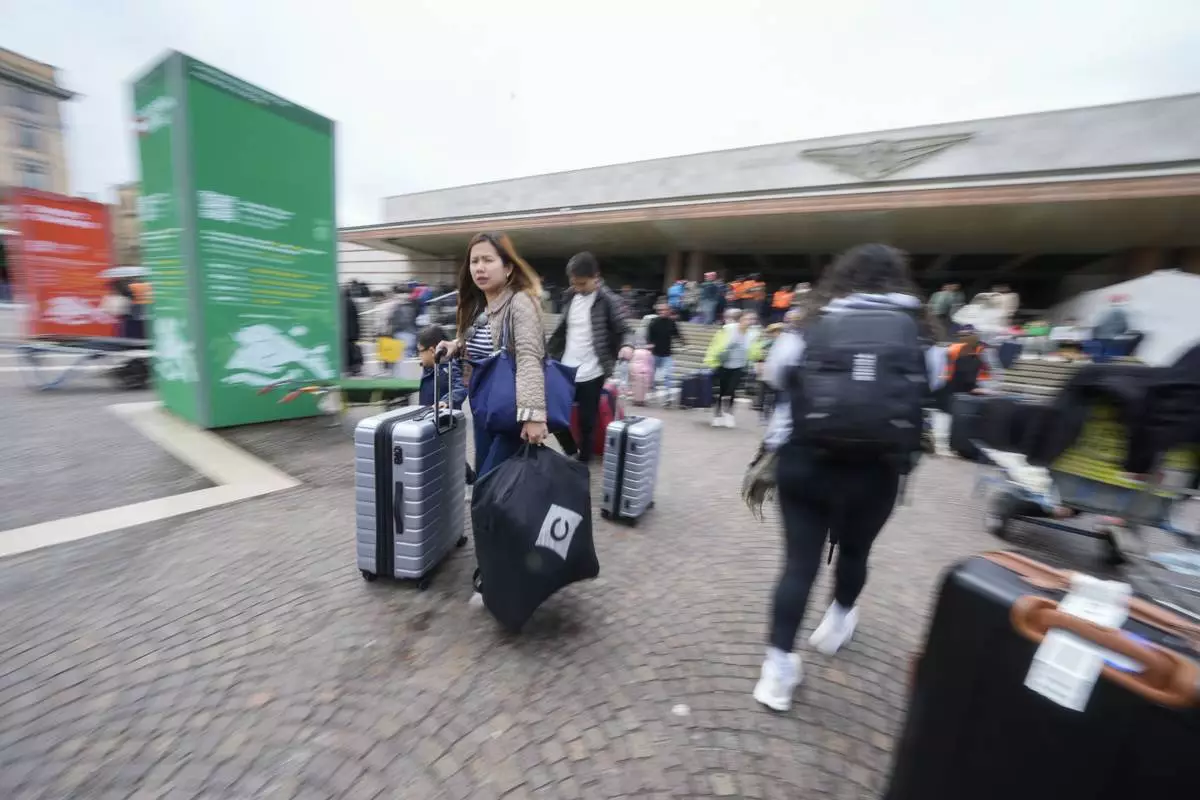
Tourists arrive at the main train station in Venice, Italy, Wednesday, April 24, 2024. The lagoon city of Venice begins a pilot program Thursday, April 25, 2024 to charge daytrippers a 5 euro entry fee that authorities hope will discourage tourists from arriving on peak days. Officials expect some 10,000 people will pay the fee to access the city on the first day, downloading a QR code to prove their payment. (AP Photo/Luca Bruno)
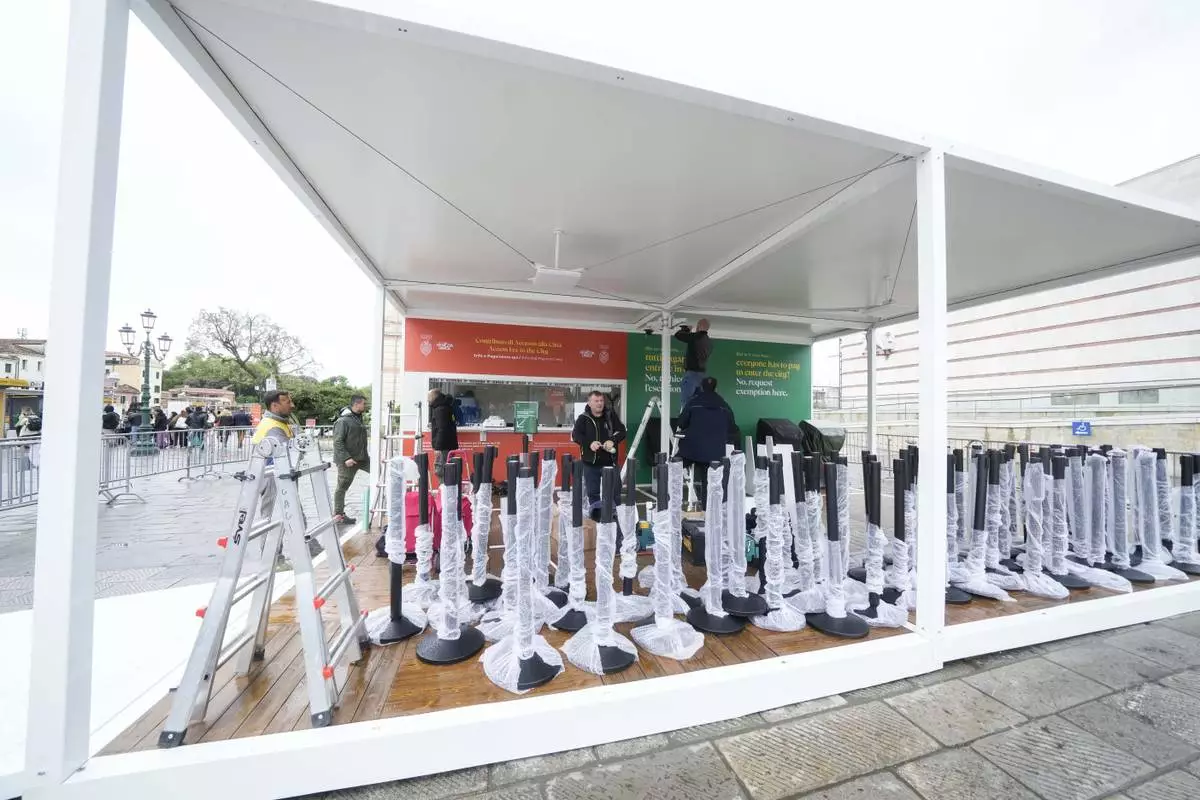
Workers prepare the tourist tax cashier desks outside the main train station in Venice, Italy, Wednesday, April 24, 2024. The lagoon city of Venice begins a pilot program Thursday, April 25, 2024 to charge daytrippers a 5 euro entry fee that authorities hope will discourage tourists from arriving on peak days. Officials expect some 10,000 people will pay the fee to access the city on the first day, downloading a QR code to prove their payment. (AP Photo/Luca Bruno)
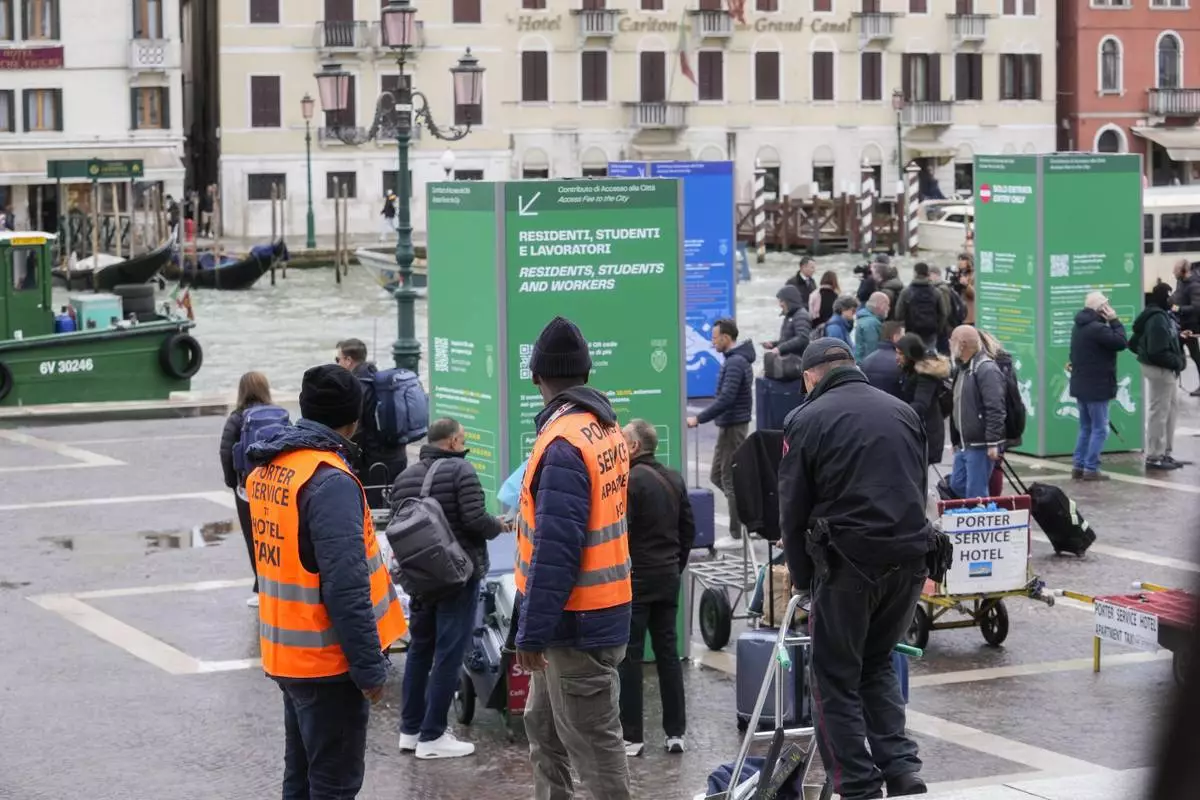
Porters wait for tourists outside the main train station in Venice, Italy, Wednesday, April 24, 2024. The lagoon city of Venice begins a pilot program Thursday, April 25, 2024 to charge daytrippers a 5 euro entry fee that authorities hope will discourage tourists from arriving on peak days. Officials expect some 10,000 people will pay the fee to access the city on the first day, downloading a QR code to prove their payment. (AP Photo/Luca Bruno)
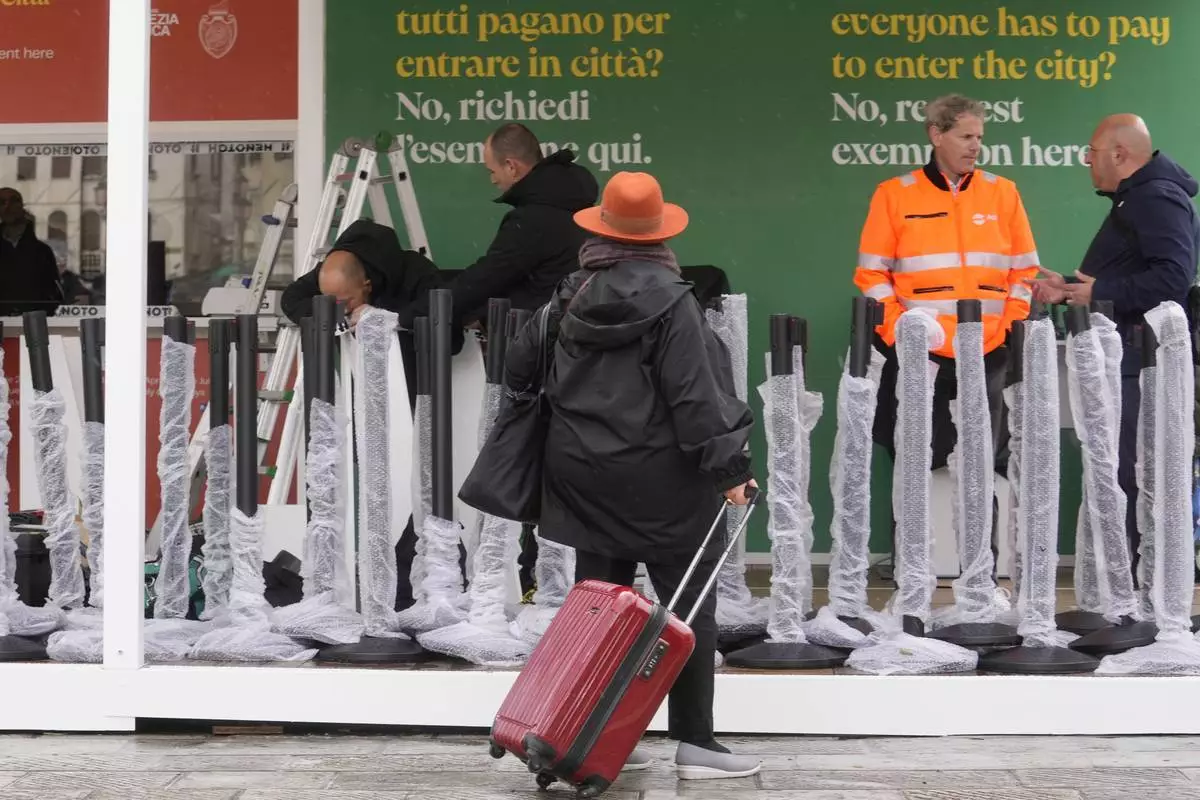
Workers prepare the tourist tax cashier desks outside the main train station in Venice, Italy, Wednesday, April 24, 2024. The lagoon city of Venice begins a pilot program Thursday, April 25, 2024 to charge daytrippers a 5 euro entry fee that authorities hope will discourage tourists from arriving on peak days. Officials expect some 10,000 people will pay the fee to access the city on the first day, downloading a QR code to prove their payment. (AP Photo/Luca Bruno)
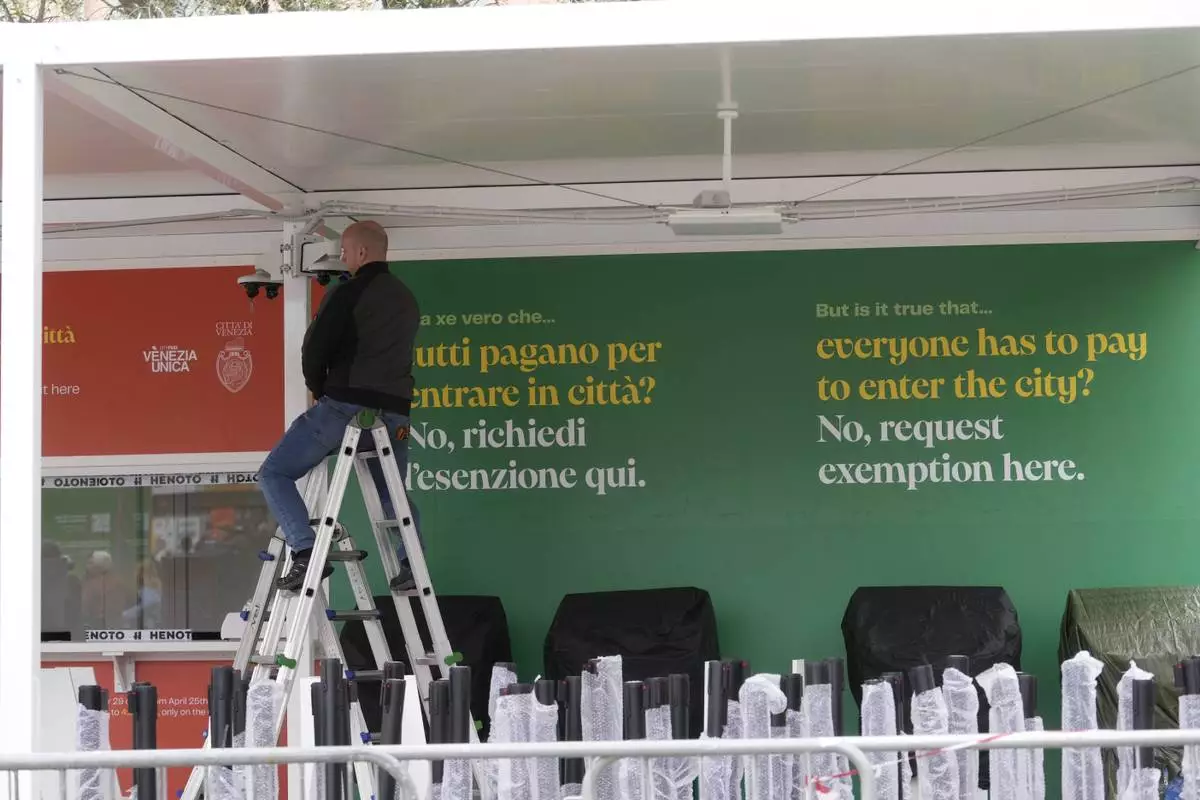
Workers prepare the tourist tax cashier desks outside the main train station in Venice, Italy, Wednesday, April 24, 2024. The lagoon city of Venice begins a pilot program Thursday, April 25, 2024 to charge daytrippers a 5 euro entry fee that authorities hope will discourage tourists from arriving on peak days. Officials expect some 10,000 people will pay the fee to access the city on the first day, downloading a QR code to prove their payment. (AP Photo/Luca Bruno)
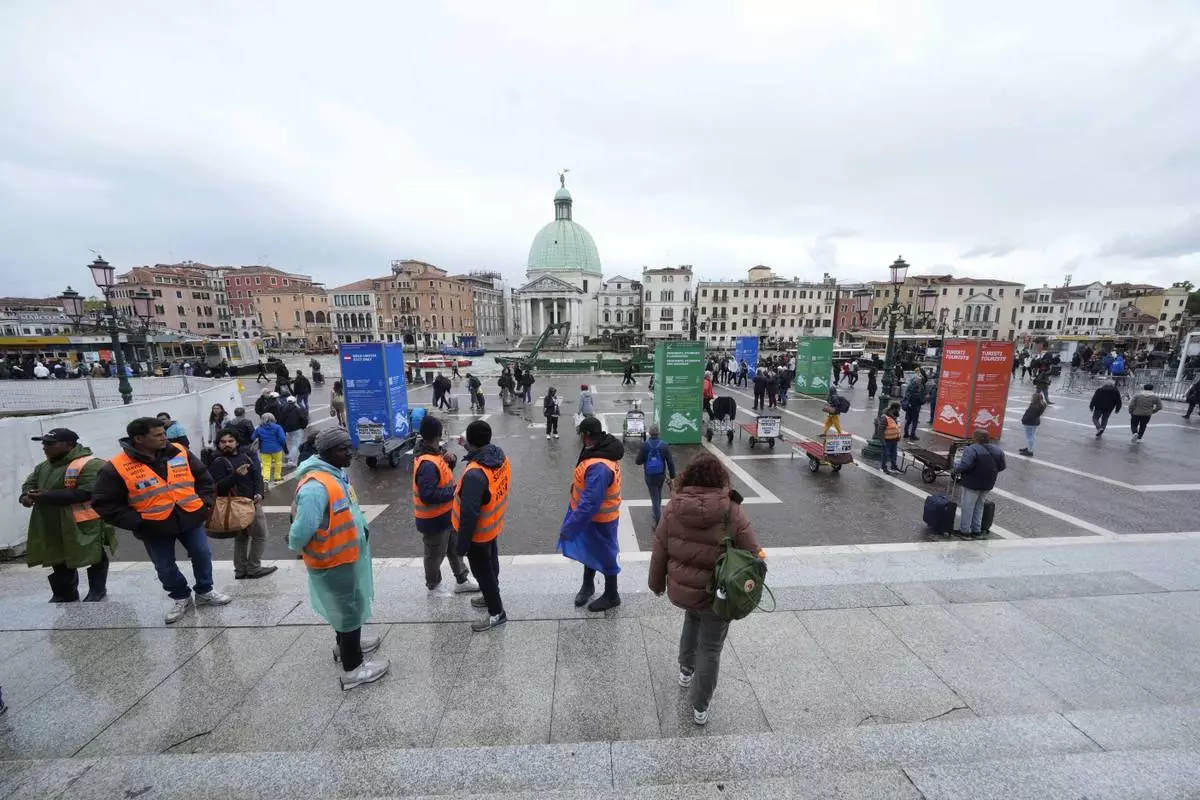
Porters wait for tourists outside the main train station in Venice, Italy, Wednesday, April 24, 2024. The lagoon city of Venice begins a pilot program Thursday, April 25, 2024 to charge daytrippers a 5 euro entry fee that authorities hope will discourage tourists from arriving on peak days. Officials expect some 10,000 people will pay the fee to access the city on the first day, downloading a QR code to prove their payment. (AP Photo/Luca Bruno)
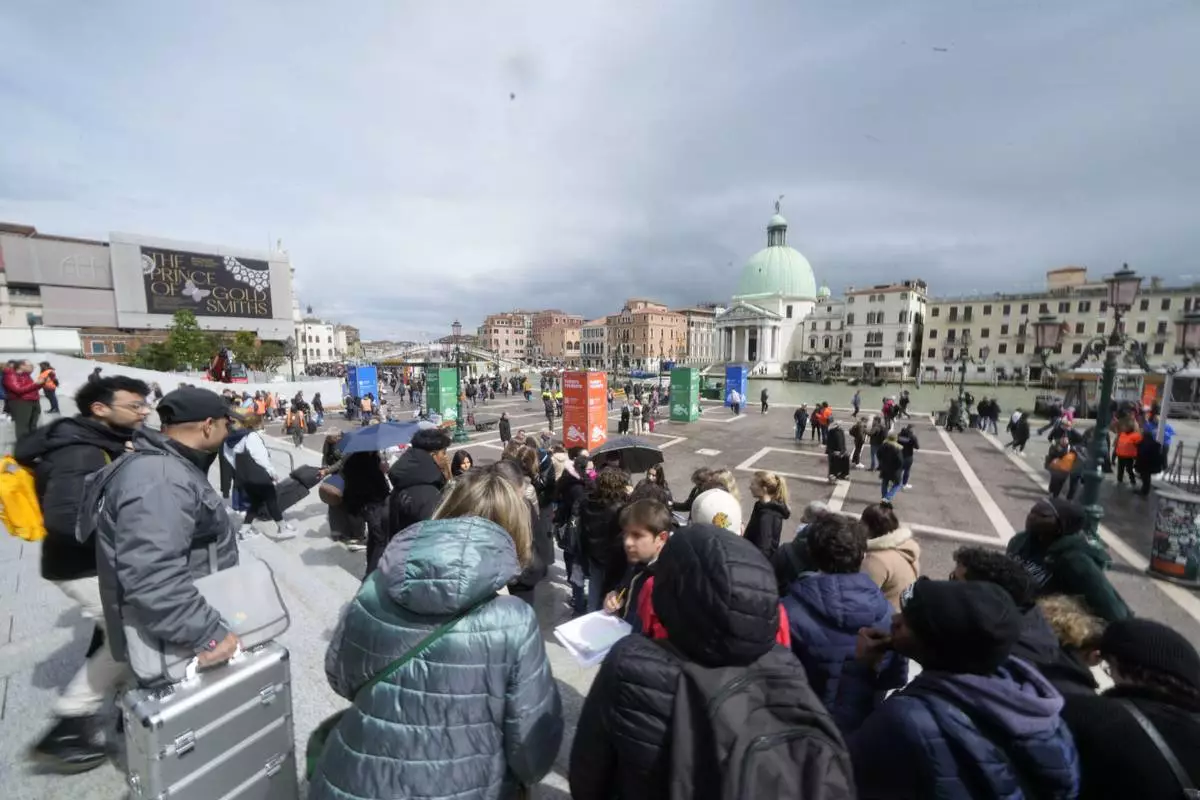
Tourists arrive outside the main train station in Venice, Italy, Wednesday, April 24, 2024. The lagoon city of Venice begins a pilot program Thursday, April 25, 2024 to charge daytrippers a 5 euro entry fee that authorities hope will discourage tourists from arriving on peak days. Officials expect some 10,000 people will pay the fee to access the city on the first day, downloading a QR code to prove their payment. (AP Photo/Luca Bruno)
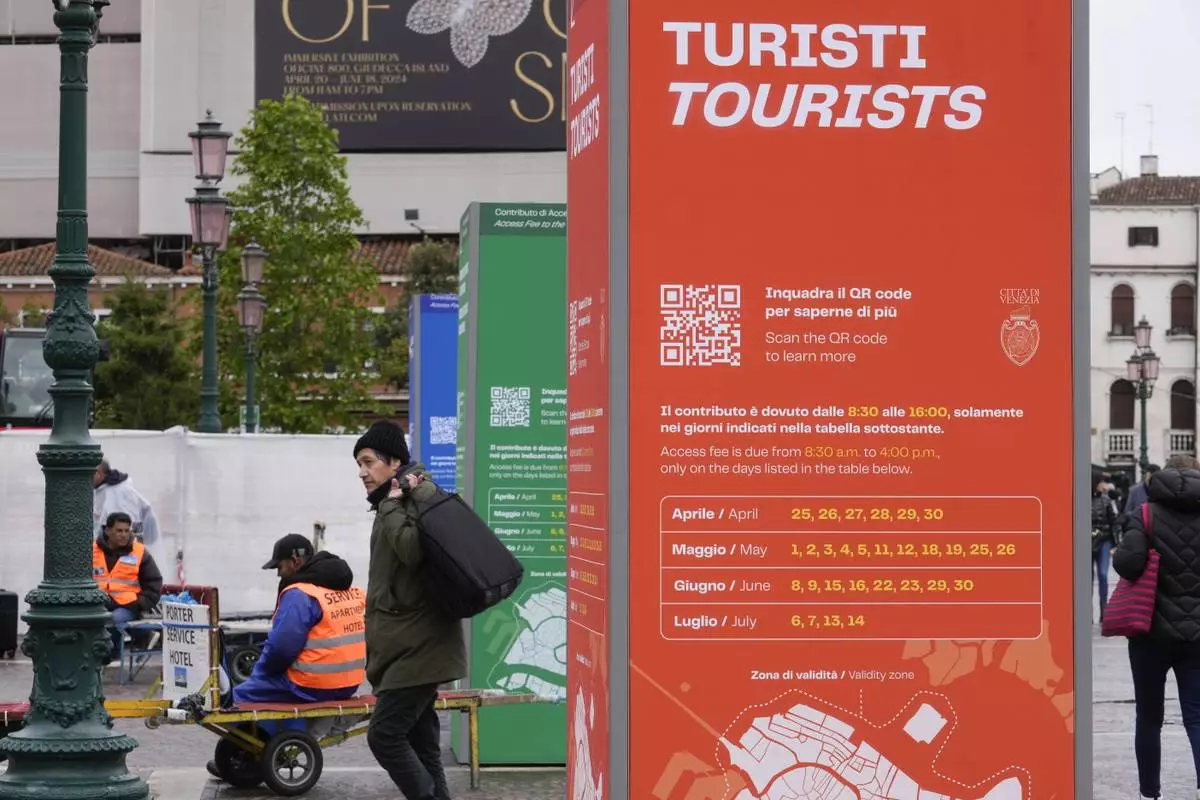
Tourist information boards are seen outside the main train station in Venice, Italy, Wednesday, April 24, 2024. The lagoon city of Venice begins a pilot program Thursday, April 25, 2024 to charge daytrippers a 5 euro entry fee that authorities hope will discourage tourists from arriving on peak days. Officials expect some 10,000 people will pay the fee to access the city on the first day, downloading a QR code to prove their payment. (AP Photo/Luca Bruno)
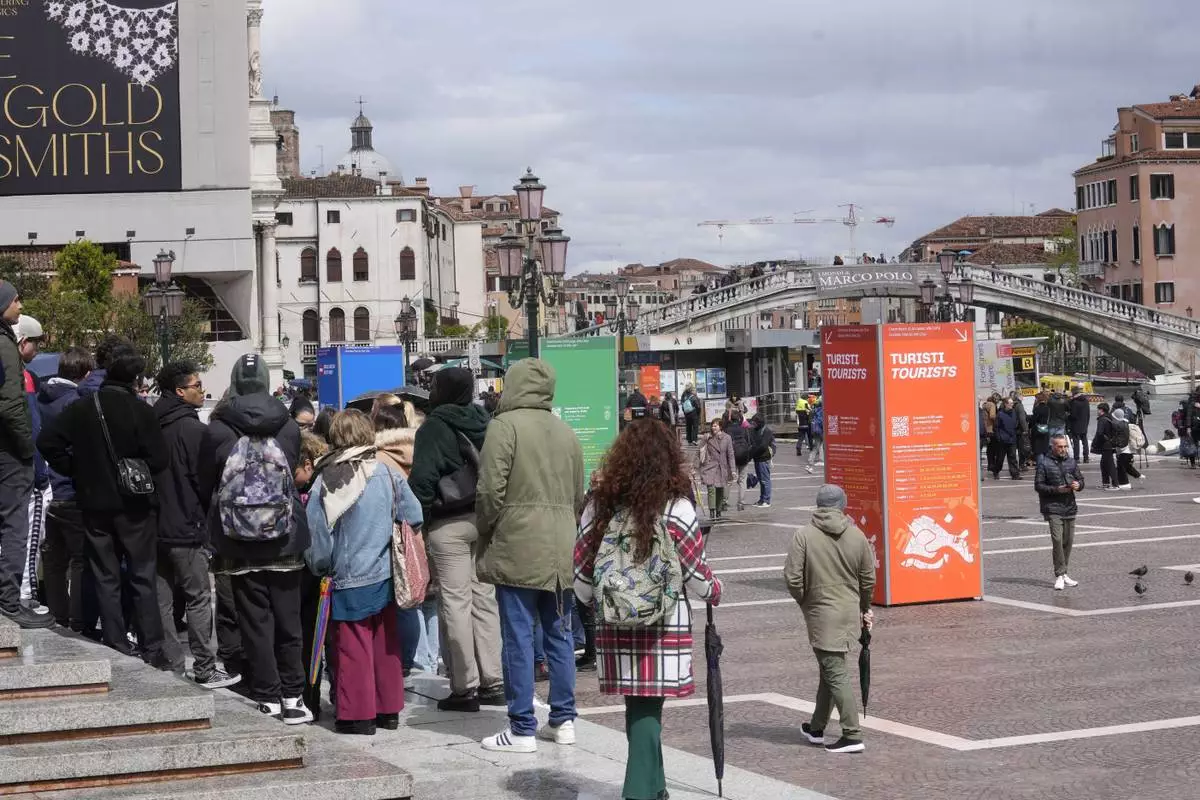
Tourists arrive outside the main train station in Venice, Italy, Wednesday, April 24, 2024. The lagoon city of Venice begins a pilot program Thursday, April 25, 2024 to charge daytrippers a 5 euro entry fee that authorities hope will discourage tourists from arriving on peak days. Officials expect some 10,000 people will pay the fee to access the city on the first day, downloading a QR code to prove their payment. (AP Photo/Luca Bruno)


























